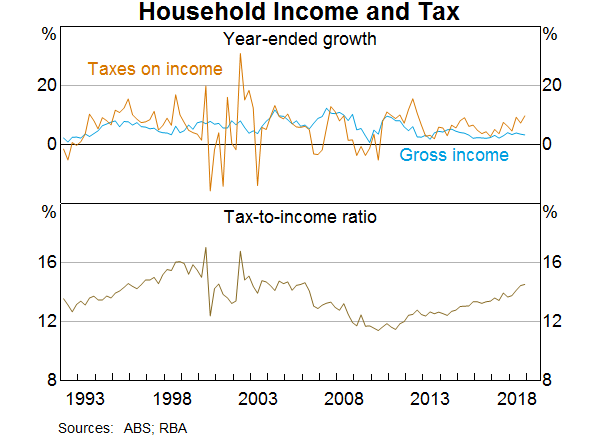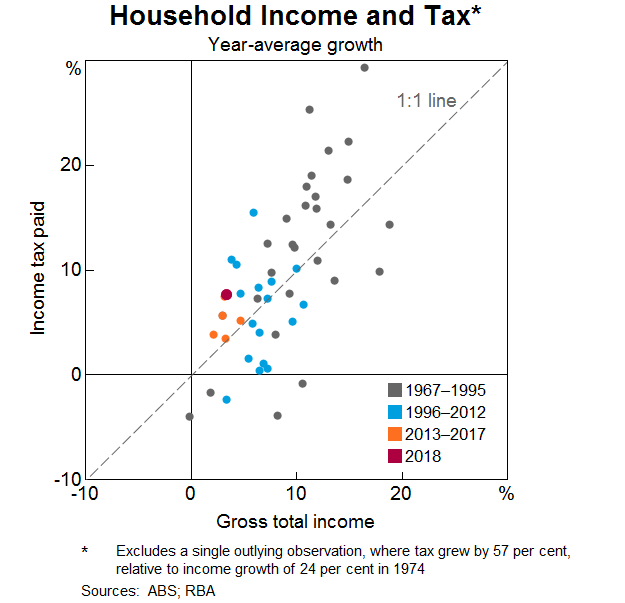Nexus between wages, labour markets, household spending and housing being watched by RBA

The RBA has noted despite the relatively weak picture for household income growth, the tax revenue collected from households has grown solidly in recent years.
In the past year, taxes paid by households increased by around eight per cent, more than double the rate of growth in gross household income of 3½ per cent, according to the RBA assistant governor Luci Ellis, in a speech to the Housing Industry Association.
"It's normal for growth in tax revenue to outpace income growth a bit: that is how a progressive tax system works," Ellis said in the speech titled What's Up (and Down) with Households?
"A useful rule of thumb is that, in the absence of adjustments to tax brackets to allow for bracket creep, for every one percentage point of growth in household income, taxes paid by households will on average increase by about 1.4 percentage points.
"So the ratio is more like a bit over two-to-one at the moment, rather than 1.4 to one.
"That is at the high end of the range this ratio reaches, but as this graph shows, it is not unprecedented (Graph 12).
"But this effect has cumulated over time, so that the share of income that is paid in tax has been rising (Graph 12, bottom panel).
Ellis noted that household income growth has remained slow even as labour market conditions have been improving.
"Unlike slow wages growth, though, it is less clear how much weak non-labour income growth will weigh on consumer spending."
"There might be reasons to think that weak non-labour income growth is less worrisome than weak wages growth.
"But you would not want to rely on that possibility to underpin your views on the outlook for consumption.
"So this is an area we need to watch closely.
"Household consumption spending is a large part of economic activity.
"A significant retrenchment there would lower growth and feed back into a weaker labour market, as well as into decisions to purchase housing," she said.

Ellis noted what is noteworthy is that for all of the past six years, growth in tax paid has exceeded income growth by an above-average margin, at a time when income growth itself has been slow (Graph 13).

"Aside from the usual bracket creep, some deductions and offsets have declined, boosting the overall tax take.
"Interest rates on investment property loans are now higher than for owner-occupiers, but overall the interest rate structure on mortgages is lower than it was a few years ago.
"So landlords will have lower tax deductions for interest payments on loans on investment properties.
"At the same time, the significant run-up in housing prices in some cities over the past decade will have increased the capital gains tax liability paid by investors selling a property.
"Turnover in the housing market has declined.
"But as best we can tell, the price effect has dominated the effect of declining volumes, and total capital gains tax paid has increased."
She noted compliance efforts and technological progress in tax collection have boosted revenue collected from a given income.
Eliis further noted some of these drivers boosting tax paid could persist for a while, but they aren't permanent.
"For example, the earlier period of strong housing price growth will only increase capital gains tax revenue if the asset was owned during that period.
"It can be expected to become less important, the further into history it passes.
"Similarly, increased compliance increases the level of tax paid on a given level of income.
"It is not a change in the trend growth rate in tax paid. That said, the effect could last for a while as efforts shift to different aspects of compliance."
Ellis's speech concluded that without enough income, and so without a strong labour market, confidence and capacity would be in doubt.
"This is not the only reason we are watching labour market developments closely.
"But the nexus between labour markets, households and housing are crucial to our assessment of the broader outlook," Ellis said.
To read Ellis' full speech, click here.